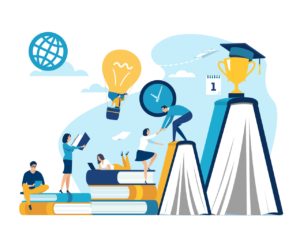
Support students’ basic needs
If we learned anything this summer, it’s that working under conditions of uncertainty and crisis makes it hard to get the work done. This is equally true for students, and it is true at the macro-level of statewide budgeting as well as the micro-level of individual budgeting and food and housing insecurity. In 2018-19, just over 1,900 UAF undergraduates (nearly 40%) received federal Pell grants, indicating a significant financial need in paying for school. Students’ basic needs must be met in order for them to be successful in their classes. Faculty can help by accommodating extenuating circumstances and referring students to UAF resources.
UAF Resources
UAF students have access to a food pantry, emergency scholarships, housing support and more — though many either do not know about these resources or face barriers (including stigma) to access them. Help students use these resources by sharing information in your syllabus and in conversation:
Center for Student Rights and Responsibilities & Student Care Team: This is a one-stop-shop for student needs, where the staff is prepared to help with anything from academic support to navigating extenuating circumstances. Walk students to their office (110 Eielson Building) or offer to help them make a phone call and set up an appointment: 474-7317. Please visit https://uaf.edu/csrr/ for additional information on the services provided.
Student Support Services: This office takes a holistic and student-centered approach to support first-generation, low-income students, and students with disabilities. Students who qualify get academic support as well as access to financial assistance, technology loans, and a community of students and advisors they can relate to.
UAF Food Pantry: Students can get a grocery bag full of food, no questions asked, from the UAF food pantry once a week. Hours are limited and posted on their website.
Disability Services: Students who experience a disability (including nonvisible disabilities such as chronic diseases, learning disabilities, head injury, attention-deficit/hyperactive disorder, psychiatric disabilities) can work with Disability Services to establish needed accommodations. Forms and appointments are available on their website.
Student Health Center: Students who pay the health center fee have access to primary health care (including lab services and vaccinations) and counseling services (up to six sessions/semester). Call 474-7043 or walk in (203 Whitaker Building) for appointments.
More student resources at UAF (PDF).
You might copy and paste these resources just as they are into your syllabus. You might also create a customized policy for your students that recognizes the challenges of meeting basic needs and offers to help.
Supportive Course Design
Beyond adding information to your syllabus, you can make accommodations in your course design to be maximally supportive of all students, including those who may need extra support as they juggle other needs.
- Include a “Shit Happens” clause and/or consistently flexible deadlines for students who may need to shift their priorities away from academics for a time to meet other needs. See this example from a “Current Topics in Educational Technology” course: “We have lives. Our health is important. Privacy is important. If at any point in the semester you encounter extenuating life circumstances, you can receive a 3-day extension on any assignment. No explanation required. This policy was inspired by a Tweet.
- Replace your textbook with Open Education Resources (OER), which are free to students, to reduce the financial cost of your course. More on OER.
- Meet your students one-on-one at least once in the semester — even if it’s only for 10 minutes. Schedule conferences or require a visit to your office hours (including phone meetings for flexibility) and ask about why they’re in school and what questions they have.
- Share your story. Your students are more likely to ask for support — from deadline extensions to help with other needs — if you present yourself as a human with a life and needs outside of school, just like them. Find more tips on inclusive teaching here.
Further reading
Basic Needs Security and the Syllabus
How to Best Help Food and Housing Insecure Students Succeed

Kendell Newman Sadiik
Associate Director of Transformative Teaching
Instructional Designer
LION Liaison




Really appreciated reading this! Thank you Kendell!!!